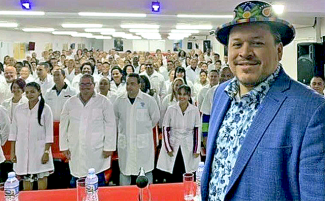¡CUBA SI!
First Nations ask Cuba
to work with them to improve healthcare

Grand Chief Jerry Daniels in Cuba with healthcare workers
IT BLOWS THE STEREOTYPES ALL TO BITS. The 34 First Nations in Manitoba took up for themselves, went searching for help and found it in Cuba. So much for the stereotype of Indigenous people unwilling or unable to help themselves. So much for the stereotype of evil socialists.
Jerry Daniels, the Grand Chief of the Southern Chiefs’ Organization (SCO), which represents 34 First Nations in Manitoba, led a delegation to Havana in February to meet with Cuban healthcare officials and tour its local medical facilities.
The Cuban connection
The visit was a follow-up to a presentation the Cuban Health Ministry had made to a number of western Canadian First Nations. The SCO Havana trip fit in well with an ongoing pro-active effort among First Nations to become even more self-reliant and give individual Indigenous communities more control over their own health care.
Daniels says, his group had looked at healthcare systems across the country and beyond “in search of a system that lands them the best return on their health-care investments.”
Daniels says the Cuban system was the best they found. Thanks to its focus on preventive medicine to overcome the handicap of a weak economy and inadequate infrastructure. “They have probably the best health return-on-investment system in the world,” he said.
According to the World Bank, Cuba has three times as many doctors per capita as Canada: 8.2 doctors for every 1,000 citizens in Cuba; Canada has 2.6 per 1000.
“(Cuba’s) doctors perform very well on very limited amount of resources,” says Daniels. “In comparison, First Nations have been in the same situation.”
Daniels is aware some might object to Canadians accepting help from a communist country. He says: “We just want to be focused on our health outcomes; we don’t want to get into the governance of any other country.”
Community-driven
“We’re doing it on a community-driven basis because they’re the ones that know the priorities, they’re the frontline workers being able to support them with the tools to make health delivery better for their communities,” he said.
Daniels told the Winnipeg Free Press he expected the first Cuban doctor would arrive sometime this year to begin practising in Gambler First Nation, a small rural community (population 293) 350 km west of Winnipeg. Better, he said, students from Manitoba would also soon head south to Cuba to begin their medical training.
Problem is, our government has so far refused to issue a visa to allow the Cuban doctors to come to Canada.
Daniels hopes the galloping advance of the COVID-19 pandemic will change that. On February 29 Daniels sent an urgent letter to Prime Minister Justin Trudeau formally asking the federal government to immediately allow not just one doctor, but Cuban Health Care Brigades, into Canada and onto reserves to help provide urgent medical care where it will be needed most.
Cuban health care brigades go everywhere
Cuban brigades are already doing just that in other countries hard hit by the coronavirus, including Italy, Jamaica, Nicaragua, Venezuela, Suriname, and Grenada.
Within a few years of its 1959 revolution, Cuba sent its first medical brigade to Algeria. Since then, it has provided 400,000 healthcare workers on missions in 164 countries.
Cuba is also home to the Latin American School of Medicine (ELAM) that trains students from poor countries for free—including covering tuition, room and board and even a small stipend—so they could return to their home countries seven years later as debt-free doctors serving in their own communities.
Italy is the first wealthy country to accept offers of medical help from Cuba; in 2019, US President George Bush ignored Cuba’s offer to send 1,500 medical personnel to help out after Hurricane Katrina.
“The arrival in Italy of a medical brigade from Cuba is pretty historic,” says Peter Kornbluh, the director of the Cuba Documentation Project at the National Security Archive at George Washington University.
“You have a leading European nation accepting support in the form of a medical team from a small Caribbean island. It just goes to the history of Cuba’s deep and long-lasting commitment to humanitarian solidarity with other countries.”
- 30 -













Add new comment